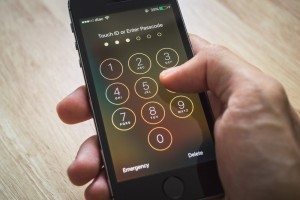 One hot button topic of conversation these days is the FBI’s request to Apple to provide a backdoor entry key to the cell phone of the San Bernardino shooters, which they have not yet been able to access and believe provides valuable information. Apple has so far resisted, which is raising powerful questions across the country on privacy and the role of the government or the technology companies to protect the vast amounts of information we store in those tiny boxes.
One hot button topic of conversation these days is the FBI’s request to Apple to provide a backdoor entry key to the cell phone of the San Bernardino shooters, which they have not yet been able to access and believe provides valuable information. Apple has so far resisted, which is raising powerful questions across the country on privacy and the role of the government or the technology companies to protect the vast amounts of information we store in those tiny boxes.
While that remains to be decided, there is another interesting question that is starting to pop up in courts across America- the possibility of police officers compelling individuals to unlock their phones by fingerprint reader capability, rather than demanding the passcode, which has always been upheld as protected by the 5th Amendment right against self-incrimination.
A troubling new case coming out of Virginia ruled that the police can legally compel you to open your phone using your fingerprint, if you have that security feature enabled as is common for many users of the newer generation iPhones. This is very different from what has always been true about the right not to turn in another password code. The ruling that the judge made was that there was a difference between the privacy you can expect for your fingerprints, which is not as strong as the protection not to verbally inform the police of your passcode. However, this makes little sense as the end results are the same, and the material being protected is not the secrecy of your fingerprint, but the material inside the phone which is essentially locked by that fingerprint as a key. You do have an expectation of privacy for the phone, rather than your fingerprint reading.
The Virginia case in question involved domestic assault, and the woman who had been victimized believed that the footage of the assault was transmitted to the defendants’ cell phone through a camera he had filming in the room. The state then determined that the defendants’ fingerprint could be used to open the phone against his will, and that the footage contained in the phone was also not protected because it had been willingly created without the state being involved in any way.
The greater question that remains to be seen is if this type of ruling could also occur in New Jersey. While our state typically affords great privacy protection to its’ citizens under the constitution, it seems that the trend towards our perception of privacy rights is increasingly changing in the deep technology age we are currently living in. One precaution that it might be wise for individuals to undertake if they believe their phone will be the subject of an investigation against their will is to power it down completely, because when turned back on, it will need the passcode fully again rather than just the fingerprint scanner.
If a situation such as the above has happened to you, seek legal counsel immediately. For a free consultation, call me, David W. Polsky, today at 973-686-9787 to see how we can help with legal assistance to review your case.

 (973) 686-9787
(973) 686-9787 Totowa, NJ 07512
Totowa, NJ 07512 Menu
Menu





